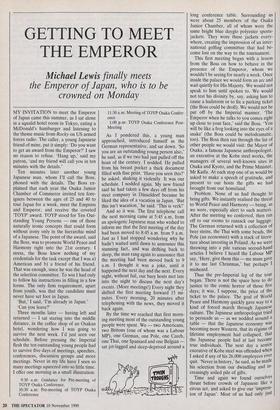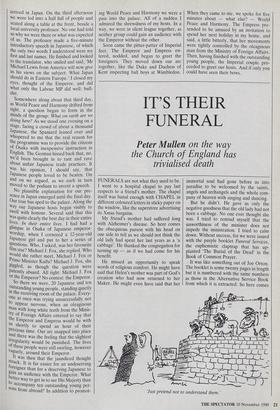GETTING TO MEET THE EMPEROR
Michael Lewis finally meets
the Emperor of Japan, who is to be crowned on Monday
MY INVITATION to meet the Emperor of Japan came this summer, as I sat alone in a squalid hotel room in Tokyo, eating a McDonald's hamburger and listening to the theme music from Rocky on US armed forces radio. The caller, a young Japanese friend of mine, put it simply: 'Do you want to get an award from the Emperor?' I saw no reason to refuse. 'Hang up,' said my patron, 'and my friend will call you in ten minutes with the details.'
Ten minutes later another young Japanese man, whom I'll call the Boss, phoned with the details. The Boss ex- plained that each year the Osaka Junior Chamber of Commerce invited ten fore- igners between the ages of 25 and 40 to tour Japan for a week, meet the Empress and Emperor, and receive the coveted `TOYP' award. TOYP stood for Ten Out- standing Young Persons — one of those naturally ironic concepts that could form without irony only in the hierarchic mind of a Japanese. The point of the award, said the Boss, was to promote World Peace and Harmony right into the 21st century. I stress, the Boss knew nothing of my credentials for the task except that I was a) American and b) a friend of his friend. That was enough, since he was the head of the selection committee. To win I had only to follow his instructions in filling in a few forms. The only firm requirement, apart from youth, was that the candidate must never have set foot in Japan.
`But,' I said, 'I'm already in Japan.' `Can you leave?'
Three months later — having left and returned — I sat staring into the middle distance, in the coffee shop of an Osakan hotel, wondering how I was going to survive the next week. I'd just seen our schedule. Before pressing the Imperial flesh the ten outstanding young people had to survive five days of meetings, speeches, conferences, discussion groups and more meetings. Never in my life have I seen so many meetings squeezed into so little time. I offer one morning as a small illustration:
9:30 a.m: Guidance for Pre-meeting of TOYP Osaka Conference.
10:30 a.m: Pre-meeting of TOYP Osaka Conference 11:30 a.m: Meeting of TOYP Osaka Confer- ence
1:00 p.m: TOYP Osaka Conference Post- Meeting As I pondered this, a young man approached, introduced himself as the German representative, and sat down. 'So you are an outstanding young person also,' he said, as if we two had just pulled off the hoax of the century. I nodded. He pulled from his breast pocket a thick document filled with fine print. 'Have you seen this?' he asked, shaking it violently. It was our schedule, I nodded again. My new friend said he had taken a few days off from his steel company in Dusseldorf because he liked the idea of a vacation in Japan. 'But this isn't wacation,' he said. 'This is verk!'
And so it was. The first telephone call the next morning came at 5:45 a.m, from an apologetic Japanese man who wished to inform me that the first meeting of the day had been moved to 8:45 a.m. from 9 a.m. Just as I had stopped wondering why he hadn't waited until dawn to announce this stunning fact, and was drifting back to sleep, the man rang again to announce that the meeting had been moved back to 9 a.m. I thought it was a joke, until it happened the next day and the next. Every night, without fail, our busy hosts met late into the night to discuss the next day's events. (More meetings!) Every night they shifted the first meeting forward 15 mi- nutes. Every morning, 20 minutes after telephoning with the news, they moved it back again.
By the time we reached that first morn- ing meeting most of the outstanding young people were spent. We — two Americans, two Britons (one of whom was a Labour MP), one German, one Pole, one Czech, one Thai, one Spaniard and one Belgian sat jet-lagged and sleep-deprived around a long conference table. Surrounding us were about 25 members of the Osaka Junior Chamber, all of whom wore the same bright blue dayglo polyester sports- jackets. They wore these jackets every- where, creating the impression of an inter- national golfing committee that had be- come lost on the way to the tournament.
This first meeting began with a lesson from the Boss on how to behave in the presence of the Emperor, whom we wouldn't be seeing for nearly a week. Once inside the palace we would form an arc and wait quietly for His Majesty. We would not speak to him until spoken to. We would not test his divinity by, say, asking him to cause a hailstorm or to fix a parking ticket (the Boss could be droll). We would not be put off by the Imperial manner. The Emperor when he talks to you comes right up close to your face,' said the Boss. 'You will be like a frog looking into the eyes of a snake' (the Boss could be melodramatic, too). The Boss then ran through the list of other people we would visit: the Mayor of Osaka, a famous Japanese anthropologist, an executive at the Kobe steel works, the managers of several well-known sites .in Osaka and Kyoto, and the Prime Minister, Mr Kaifu. At each stop one of us would be asked to make a speech of gratitude, and present to our hosts the gifts we had brought from our homeland.
Problem. None of us had thought to bring gifts. We instantly realised the threat to World Peace and Harmony — being, as we were, especially alert to such matters. After the meeting we conferred, then ran off to our rooms to ransack our luggage. The German returned with a collection of beer steins, the Thai with some beads, the Pole (an economist) with a stack of litera- ture about investing in Poland. As we were throwing into a pile various second-hand articles I believe I heard the Labour MP say, 'Here, give them this — me mum gave it to me last Christmas,' but perhaps I misheard.
Thus the pre-Imperial leg of the tour began. There is not the space here to do justice to the comic horror of those five days; it was, I suppose, the price of the ticket to the palace. The goal of World Peace and Harmony quickly gave way to a kind of forced march through Japanese culture. The Japanese anthropologist tried to persuade us — as we nodded around a table — that the Japanese economy was becoming more Western, that its regime of lifetime employment had collapsed, that the Japanese people had at last become true individuals. The next day a senior executive of Kobe steel was offended when I asked if any of his 26,000 employees ever quit. 'Never in history,' he said, as he made his selection from our dwindling and In- creasingly soiled pile of gifts. Time and again we found ourselves thrust before crowds of Japanese like a circus act, and asked to give our `impress- ion of Japan'. Most of us had only just arrived in Japan. On the third afternoon we were led into a hall full of people and seated along a table at the front, beside a local university professor. No one had told us why we were there or what was expected of us. The professor made a five-minute introductory speech in Japanese, of which the only two words I understood were my first and last names. He finished and looked to the translator, who smiled and said, 'Mr Michael Lewis from America will now give us his views on the subject: What Japan should do in Eastern Europe.' I closed my eyes, thought of the Emperor, and did what only the Labour MP did well: bull- shit.
Somewhere along about that third day, as World Peace and Harmony drifted from sight, a question began to form in the minds of the group: What on earth are we doing here? As we stood one evening on a stage, facing a crowd of about a thousand Japanese, the Spaniard leaned over and whispered to me that the real reason for the programme was to provide the citizens of Osaka with inexpensive instruction in English. The German hissed back that, no, we'd been brought in to rant and rave about unfair Japanese trade practices. It was his opinion, I should say, that Japanese people loved to be beaten. On and on we argued, as we each in turn moved to the podium to invent a speech. No plausible explanation for our pre- sence in Japan emerged until the final day. Our tour bus sped to the palace. Along the way our Japanese hosts began visibly to swell with honour. Several said that this was quite clearly the best day in their entire lives. In their entire lives. I had had a glimpse in Osaka of Japanese emperor- worship, when I cornered a 12-year-old Japanese girl and put to her a series of questions. Who, I asked, was her favourite film star? Michael J. Fox, she replied. Who would she rather meet, Michael J. Fox or Prime Minister Kaifu? Michael J. Fox, she giggled, as though the question were patently absurd. All right: Michael J. Fox or the Emperor? No contest: the Emperor. So there we were, 20 Japanese and ten outstanding young people, standing quietly in the receiving room of the palace. Every- one at once; was trying unsuccessfully not to appear nervous, when an oleaginous man with long white teeth from the Minis- try of Foreign Affairs entered to say that the Emperor and Empress would be with us shortly to spend an hour of their precious time. Our arc snapped into place and there was the feeling that the slightest irregularity would be punished. The lives of these people were still swirling, however vaguely, around their Emperor. It was then that the jaundiced thought struck. It is far easier for an undeserving foreigner than for a deserving Japanese to gain an audience with the Emperor. What better way to get in to see His Majesty than to accompany ten outstanding young per- sons from abroad? In addition to promot-
ing World Peace and Harmony we were a pass into the palace. All of a sudden I admired the shrewdness of my hosts. In a way, we were in silent league together, as neither group could gain an audience with the Emperor without the other. Soon came the pitter-patter of Imperial feet. The Emperor and Empress en- tered, nodded, and began to greet the foreigners. They moved down our arc together, like the Duke and Duchess of Kent inspecting ball boys at Wimbledon. When they came to me, we spoke for five minutes about — what else? — World Peace and Harmony. The Empress pre- tended to be amused by an invitation to spend her next holiday in my home, and said, a little bitterly, that her movements were tightly controlled by the oleaginous man from the Ministry of Foreign Affairs. Then, having finished with the outstanding young people, the Imperial couple pro- ceeded to greet our hosts. And if only you could have seen their bows.



































































 Previous page
Previous page